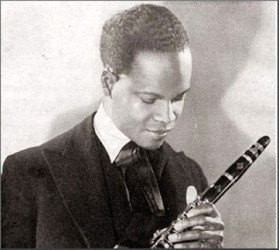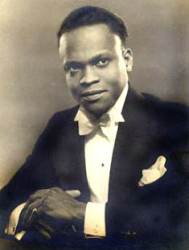Almost twenty-eight years ago a remarkable Gu-yanese died in London at the age of eighty-one. He is little known nowadays, but he was a pioneer at a time when the avenues for African Guyanese to have their talent acknowledged were severely restricted.
Born in Nabaclis on the East Coast of Demerara, in 1907, Dunbar eventually became a war correspondent, writer and eminent clarinetist and conductor. Below we reprint the obituary for him by Ian Hall, which first appeared in the London Independent of July 5, 1988, because it contains details of his life which should be of interest to readers. We first published it in our edition of July 6, 1988. He had died on June 10 of that year.
Rudolph Dunbar, grandson of a black slave, born in poverty in British Guiana, transcended the shackles of a colonial setting to become the first black man to conduct the Berlin Philharmonic Orchestra at the end of the Second World War.
He was a zealous pioneer of black involvement in Western European music, and combined a career as a musician with a marked contribution as a writer on international affairs. In 1939 he became the London correspondent of the Associated Negro Press in America, and was later appointed to be correspondent of the United States Eighth Army.
The British Guiana in which Dunbar was born offered little opportunity for the expression of individual ambition, especially in the field of orthodox European music. Dunbar, was, however, inspired by his early acquaintance with the music of Beethoven, as performed by a visiting German artist, to follow the music despite advice to the contrary from his father.


He became an apprentice in the British Guiana Militia Band as a student of the clarinet. The rigorous discipline of this early exposure was of immense value to him, and in 1926 he entered the Julliard School of Music in New York. The school (then named the Institute of Musical Art), enabled him to delve more deeply into the mysteries of harmony and counterpoint and provided the basis for his impeccable clarinet technique; equally important, however, were his increasing awareness of the plight of blacks and his ambitions for them to achieve their potential.
On graduation Dunbar advanced to Paris. Here Madame Debussy, widow of Claude Debussy, invited him to give a private recital at her home in the presence of influential members of the Conservatoire de Musique.
He was an immediate success, and he followed this with a recital at the Salle Pleyel in Paris. In 1931 the editor of the London based Melody Maker invited him to write a series of articles on clarinet technique, and as a result, he was able to establish in London his school of clarinet-playing, attracting pupils from various parts of Europe, as well as from South Africa and India. His publication Treatise on the Clarinet was founded on his experience as a teacher.
His ambition to be an orchestral conductor took him to the US in 1938, but in the following year, with war threatening, he returned to England in his new role as war correspondent. He worked for the British Ministry of Information and later teamed up with Lord (Learie) Constantine doing welfare work for West Indian civilians in the munitions factories.
Though absorbed in the war effort, Dunbar still applied himself assiduously to advancing his career in music. In April 1942 he made his debut in Britain as a symphony conductor when he conducted the London Philharmonic Orchestra at the Royal Albert Hall. At the end of the war, he gained the distinction of being the first black to conduct the Berlin Philharmonic Orchestra.
This achievement was described in the press as one in which “he raised the Negro to the highest pinnacle.”
Various invitations to conduct orchestras in other parts of the world followed; but sadly, these were sporadic. Dunbar grew increasingly introspective, and latterly devoted much of his time and energies to waging war on the racism which thwarted his progress. He remained most generous, and was always ready to advance the careers of younger musicians.







